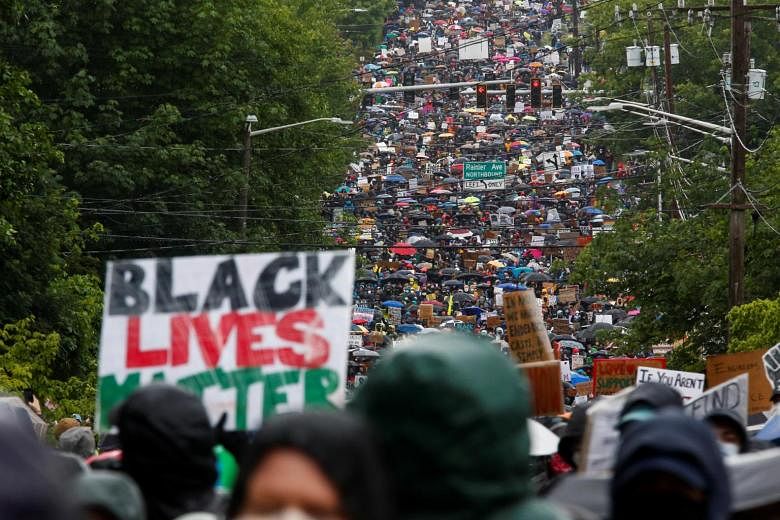The United States has been through paroxysms before, often set off by killings of African Americans by the police, but there is every indication that the current crisis triggered by the widely seen death of Mr George Floyd at the hands of the police is different, and in several aspects.
After more than two weeks of protests across the country, the outrage, unlike before, is seeing results as several states and city authorities have moved to, if not reform their police forces, at least update police rules of engagement.
President Donald Trump, while set on being "tough" on protesters, in a Fox News interview aired on Friday said the controversial chokehold used by some police departments to restrain suspects should "generally" be banned, but may still be needed in dangerous situations.
Mr Trump sparked fresh outrage for scheduling his first rally of his resumed election campaign in Tulsa, Oklahoma, on June 19, the anniversary of the end of slavery, and also the anniversary of the nation's worst massacre of black people, in Tulsa in 1921. Yesterday, he shifted the rally to June 20.
Congress is working on legal changes that include a ban on using chokeholds; a limit on immunity for officers; and restrictions on the use of military weapons.
On Friday, New York Governor Andrew Cuomo signed orders that will force reforms in the New York Police Department.
Also unlike previously, the death of Mr Floyd has galvanised sections of society who otherwise have little in common to unite in protesting against racism and police brutality.
The protests, while largely peaceful, have seen some violence and looting, and the threat of radicals on the left and right, plus police overreactions in some cases.
Results from a Pew Research survey, released on Friday, revealed that 67 per cent of Americans are supportive of the Black Lives Matter movement - including about four in 10 who offer strong support. While the sentiment is naturally particularly strong among African Americans, majorities of Caucasians (60 per cent), Hispanic (77 per cent) and Asian Americans (75 per cent) also express at least some support.
The killing of Mr Floyd is also a watershed in other respects, with the ramifications yet to fully play out.
Dr Adam Garfinkle, distinguished visiting fellow at the S. Rajaratnam School of International Studies (RSIS), wrote last Tuesday: "Racially charged civil unrest in the United States will affect the November election, undermine military morale if the President orders military force to smother protests, and further estrange Americans from supporting an active and constructive US role in global affairs... The George Floyd moment may therefore be justifiably counted as a significant historical inflection point."

While the landmark Civil Rights Act of 1964 and Voting Rights Act of 1965 were important in terms of changing the politics and direction of the US, they did not affect the daily lives of African Americans, veteran commentator Bill Moyers told CNN's chief international anchor Christian Amanpour last Wednesday. "Even though we had a new political look about us... life didn't change for people who were living in the poverty of the ghetto, who couldn't find good jobs, and then we began not to see them," he said.
"We've finally come to that moment, when we're scraping the whitewash - and it is whitewash - off of our vision of the country, and what we are seeing is not pretty, and it's not right. Unless we see the truth of what is there, we are going to be just the same as we have been for the last decades, for the last 200 years," he added.
At a June 10 Congressional hearing on police reform, California Democratic congresswoman Karen Bass said: "His (Floyd's) death cannot be in vain. It will be the catalyst for profound social change."
Mr William J. Barber II, a minister in the Protestant church, told MSNBC on Friday he had hopes for a "moral coalition" to change history. Mr Barber is among those who have called for a massive rally in Washington, DC, on Saturday.
Many analysts are also saying that, taken together, the coronavirus crisis, as well as its induced economic crash, the toxic politicisation of issues and a looming election, Mr Floyd's death and the running sores it has exposed may cumulatively sink the idea of "American exceptionalism".
In 2017, Pew Research had noted that international confidence in the US President plummeted after Mr Trump's January 2017 inauguration, while favourable ratings for the US also declined.
In the RSIS brief, Dr Garfinkle wrote: "When, for justifiable reasons or not, the nation loses its moral self-respect, as it has occasionally during the past 244 years, it cannot lift its chin to look confidently upon the world, or bring itself to ask the world to look upon America as a worthy model, let alone a leader... That is very much the mood in recent years, and particularly now... US allies and partners will need to adapt to what is an increasingly clear non-exceptionalist new American normal."
It is always a mistake to underestimate American resilience, Dr Robert Manning, resident senior fellow at the Atlantic Council's Scowcroft Centre for Strategy and Security, told The Sunday Times.
But he added: "Having said that, in my lifetime, I've never seen American politics so polarised... and I think there has been a cumulative impact on people's perceptions of the United States."

